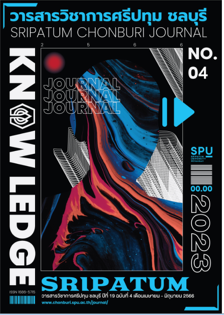MODEL OF ASTROLOGICAL BELIEF AFFECTING PURCHASE INTENTION THROUGH PURCHASE AND POST PURCHASE BEHAVIOR BELIEFS OF CONSUMERS
Keywords:
Astrological Belief, Purchase Decision, Post Purchase BehaviorAbstract
This study aimed to analyze the confirmatory factors of astrological belief, purchase decision, post-purchase behavior, and purchase intention, and investigate the influence of astrological belief, through purchase decision and post-purchase behavior, on purchase intention which was in agreement with empirical data. Population included consumers aged 20 years old and older who relied partly on astrological belief when purchasing goods, their post-purchase behavior and purchase intention. Structural equation model analysis (SEM) which was a multivariate analysis was used for analyzing the data. The sample size was 340 samples, equal to 20 times of the variables in the model, which were derived from number of observed variables (17) timed by 20.
The results showed that the confirmatory component analysis of astrological belief had CR=.946 and AVE=.778, purchase decision had CR=.858 and AVE=.520, post-purchase behavior had CR=.956 and AVE=.878 and purchase intention had. CR=.903 and AVE=.757. The analysis of influence of astrological belief in the models showed that astrological belief affects to purchase intention as complete mediation in both models with statistical significance at the .01 level. Astrological belief affected purchase decision, post-purchase behavior and to purchase intention as complete mediation in both models with statistical significance at the .001 level. This can be concluded that astrological belief affected purchase intention through purchase decision and post-purchase behavior and this agreed with the empirical data.
References
กัลยา วานิชย์บัญชา. (2562). การวิเคราะห์สมการโครงสร้าง (SEM) ด้วย AMOS. กรุงเทพฯ: สามลดา
ธนภณ นิธิเชาวกุล, กัญจนวลัย นนทแก้ว แฟร์รี่, วรรณภา ลือกิตินันท์ และกีรติกร พุฒิวิญญู. (2565). ลักษณะประชากรศาสตร์ที่ส่งผลต่อ
ความตั้งใจซื้อสินค้าตามความเชื่อหลักโหราศาสตร์ของผู้บริโภค อำเภอเมือง จังหวัดชลบุรี. วารสารสหศาสตร์ศรีปทุมชลบุรี, 8(1),
หน้า 73-84.
แบรนด์เอจ ออนไลน์. (2564). เมื่อ 'มูเตลู' กลายเป็นเครื่องมือทางการตลาด (ออนไลน์). เข้าถึงได้จาก:
https://www.facebook.com/brandageonline/photos/a.466989453828/10159570435583829/ [2564, 28 พฤษภาคม].
สำนักงานสภาพัฒนาการเศรษฐกิจและสังคมแห่งชาติ. (2562). ข้อมูลสถิติด้านเเรงงาน (ออนไลน์). เข้าถึงได้จาก:
https://www.nesdc.go.th/main.php?filename=social [2564, 18 กุมภาพันธ์].
สุภชัย ปกป้อง. (2562). คนไทยกับตลาดความเชื่อ (ออนไลน์). เข้าถึงได้จาก: https://www.kaohoon.com/content/313152
, 3 กรกฎาคม].
สุภมาส อังศุโชติ สมถวิล วิจิตรวรรณา และรัชนีกูล ภิญโญภานุวัฒน์. (2552). สถิติวิเคราะห์สำหรับการวิจัยทางสังคมศาสตร์และ
พฤติกรรมศาสตร์: เทคนิคการใช้ โปรแกรม LISREL. กรุงเทพฯ: โรงพิมพ์ เจริญมั่นคงการพิมพ์.
Aeschleman, S.R., Rosen, C.C., & Williams, M. R. (2003). The effect of non-contingent negative and positive
reinforcement operations on the acquisition of superstitious behaviors. Behavioural Processes, 61(1-2),
pp. 37-45.
Ajzen, I. (1991). The theory of planned behavior. Organizational Behavior and Human Decision Processes, 50(2),
pp. 179-211.
Block, L., & Kramer, T. (2009). The effect of superstitious beliefs on performance expectations. Journal of the
Academy of Marketing Science, 37(2), pp. 161-169.
Bourassa, S.C., & Peng, V.S. (1999). Hedonic prices and house numbers: The influence of feng shui. International
Real Estate Review, 2(1), pp. 79-93.
Doucouliagos, H. (2004). Number preference in Australian stocks. Applied Financial Economics, 14(1), pp. 43-54.
Hair, J. F., Black, W. C., Babin, B. J., & Anderson, R. E. (2010). Multivariate data analysis (7th ed.). New York:
Pearson Education.
Hamerman, E. J., & Johar, G. V. (2013). Conditioned Superstition: Desire for Control and Consumer Brand
Preferences. Journal of Consumer Research, 40(3), pp. 428–443.
Karl, G. Joreskog, & Dag, Sorbom. (1993). LISREL 8 : Structural equation modeling with the SIMPLIS command
language. Chicago: Scientific Software International.
Kotler, Philip & Keller, Kevin Lane. (2016). Marketing management (15th ed.). Upper Saddle River, NJ: Prentice-Hall.
Kramer, T., & Block, L. (2008). Conscious and nonconscious components of superstitious beliefs in judgment and
decision making. Journal of Consumer Research, 34(6), pp. 783-793.
Lin, MT-Y. (2019). Effects of Experiential Marketing on Experience Value and Customer Satisfaction in Ecotourism.
Foundation Environmental Protection & Research, 28(107), pp. 3151-3156.
Pickering, J.F., & Isherwood, B.C. (1974). Purchase probabilities and consumer durable buying behaviour. Journal
of market research society, 16(3), pp. 203-226.
Pratt, S., & Kirillova, K. (2019). Are hotel guests bothered by unlucky floor or room assignments?. International
Journal of Hospitality Management, 83, pp. 83-94.
Sierra, J. J., Hyman, M. R., Lee, B. K., & Suh, T. (2017). Intrinsic Religiosity and Attitude toward Finales as Precursors
of Superstitious Beliefs: A Cross-Cultural Investigation. Asian Journal of Business Research, 7(1), pp. 58-78.
Vaidyanathan, R., Aggarwal, P., & Bakpayev, M. (2018). A Functional Motivation Framework for Examining
Superstitious Behavior. Journal of the Association for Consumer Research, 3(4), pp. 454-465.
Wong, K. F., & Yung, L. (2005). Do dragon have better fate?. Economic Inquiry, 43(3), pp. 689-697.
Downloads
Published
Issue
Section
License
Copyright (c) 2023 วารสารวิชาการศรีปทุม ชลบุรี Sripatum Chonburi Journal

This work is licensed under a Creative Commons Attribution-NonCommercial-NoDerivatives 4.0 International License.
บทความทุกบทความเป็นลิขสิทธิ์ของวารสารวิชาการศรีปทุม ชลบุรี



